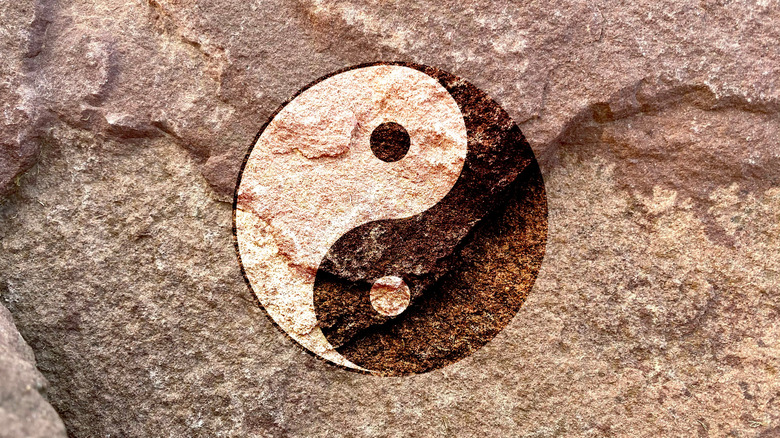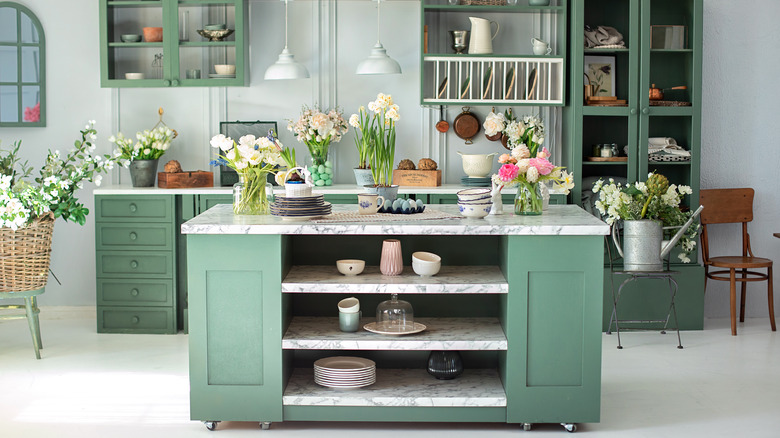How To Feng Shui Your Kitchen
Once considered merely a service area distinct from the rest of your house, the kitchen is now thought to be the heart of the home. Creating harmony and balance in this space is vital to a healthy lifestyle, and adhering to the principles of feng shui can help you reach that goal.
From the ancient Chinese, feng shui can be described as the art of balancing yin and yang, the opposite yet complementary energies in everything. This is essential in improving the flow of the life force chi. Feng shui, which translates to wind and water per the National Geographic Society, is rooted in the dogma of Taoism. Its central concept of harmonizing life forces to achieve balance is at least 4,000 years old, and has now entered Western thought. Feng shui identifies five elements: fire, earth, wood, water, and metal. Integrating them successfully is central to influencing the flow of positive energy. According to Crane & Canopy, two other fundamental components are the traditional Chinese compass (luo-pan) and the energy map known as (bagua).
By its very nature, the kitchen is a home's focal point. In simple terms, it is where food is cooked. In feng shui terms, it symbolizes health, prosperity, and positive energy. The kitchen is where fire counteracts negative chi, according to Feng Shui Nexus. Having a kitchen that is located auspiciously, arranged harmoniously, lit well, and colored properly, will be feng shui-appropriate. It may even improve your life.
Everything in its place
Per Love To Know, a kitchen's location and placement of its appliances are paramount. Contrasting elements such as fire and water (or hot and cold) are also to be considered. A kitchen door directly facing front or back doors is thought to allow positive vibrations to escape. Food52 states that a kitchen should be located at the rear of a house, and the main cooking appliance should be situated where you feel least vulnerable. Known as the command position, an island set-up works well for this, and having a wall behind it adds to the feeling of security. Balancing water-related appliances, such as the sink and refrigerator, with fire ones, including the stove and oven, breeds harmony. An outside kitchen is not feng shui worthy. Bathrooms should neither face the kitchen nor be next to it, and a kitchen should not be situated underneath an upstairs restroom.
Decluttering a kitchen's surfaces is important both practically and metaphorically, according to Mind Body Green. Discarding rarely used or damaged dishes, pots, and utensils encourages balance. Continuously rid your pantry and refrigerator of outdated food items. Cleaning appliances, countertops, and the floor itself are mandatory in observing feng shui. A natural cleanser, perhaps diluted white vinegar, is recommended. A shipshape kitchen is a harmonious one. Culling the dross from your kitchen will enliven the energy while creating more abundance.
More feng shui suggestions
Color and lighting are important factors. Fluorescent bulbs are a no-no, and My Domaine suggests a combination of lighting types, including natural light if a kitchen has a window. White or other light colors will help a small kitchen feel bigger. There are many hues that will have a calming effect when used in combination. Blues resembling the sky can be affectively paired with greens and grays. Per Love To Know, reds should be avoided.
There is a litany of other tips for combatting the bad chi. Mops and brooms should always be closeted and towels should not be hung on oven door handles. Never leave pantry doors open or dishes in the sink. Conversely, copper pots and pans are considered to be a magnet for good energy and a full bowl of fruit, real or fake, is thought to stimulate abundance.
A kitchen that looks claustrophobic is negative. Having glass cabinet doors can offer an antidote for this. Knives should never be displayed openly, as this is symbolic of aggression, and open shelves should be avoided. A kitchen's feng shui can be enhanced with potted herbs, cookbooks, kitchen-themed artwork, or family photos. A kitchen attracting positive energy will always be well-ventilated.


